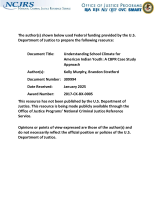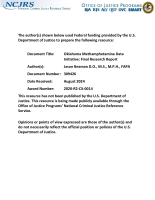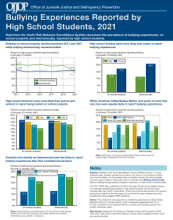American Indians
Atwood Program, Lexington Federal Medical Center
Understanding School Climate for American Indian Youth: A CBPR Case Study Approach
30 Years of the Violence Against Women Act: Endurance, Expansion, and the Next Era
Summary of a plenary panel from the 2024 NIJ Research Conference
Guiding Interpretation: Leveraging High-Density SNP Data from Major U.S. Populations for Forensic Genetic Analyses
Advancing Justice for the Missing and Unidentified Through Research - 2024 NIJ Research Conference
Forensic science research is developing essential knowledge to fill in the holes in death investigations, creating new ways to identify challenging skeletal remains. These methods inform cause of death, time of death, and familial relationships to guide investigations, identify suspects, support prosecutions, and bring justice to families.
See the YouTube Terms of Service and Google Privacy Policy
Stature Estimation Equations for Modern American Indians in the American Southwest
Oklahoma Methamphetamine Data Initiative: Final Research Report
Long-term Impact of the Fostering Healthy Futures for Preteens Program on Suicide-related Thoughts and Behaviors for Youth in Out-of-home Care: A Randomized Controlled Trial
Association of Depression, Comorbidities, and Sociodemographic Factors among Home Healthcare Recipients
Five Things to Know About Women and Reentry
US forensic Y-chromosome short tandem repeats database
Flanking Region Variation of ForenSeq (TM) DNA Signature Prep Kit STR and SNP Loci in Yavapai Native Americans
Peopling of the Americas: A new approach to assessing dental morphological variation in Asian and Native American populations
Exploring strengths, psychological functioning and youth victimization among American Indians and Alaska Natives in four southern states
Bullying Experiences Reported by High School Students, 2021
Refining Asian Ancestry Classifications via Cranial Macromorphoscopic Traits
Gender-Based Violence and the Latinx Community
See the YouTube Terms of Service and Google Privacy Policy
Findings from the Federal, State, and Tribal Response to Violence Against Women in Indian Country Studies
Embracing Tribal Culture to Build Research Partnerships
The Adaptation and Evaluation of the Fourth R Youth Dating Violence Curriculum for Indigenous Communities
Tribal Crime, Justice, and Safety, Part 2
Stacy Lee Reynolds and Christine (Tina) Crossland continue their discussion of tribal crime, justice, and safety, including how Native American persons experience crime victimization at higher rates than non-Native people and the jurisdictional complexities in responding to tribal crime, justice, and safety. Read the transcript.
Listen to the first half of Stacy and Tina’s discussion.
Reading and Resources from NIJ
Tribal-Researcher Capacity Building Grants







